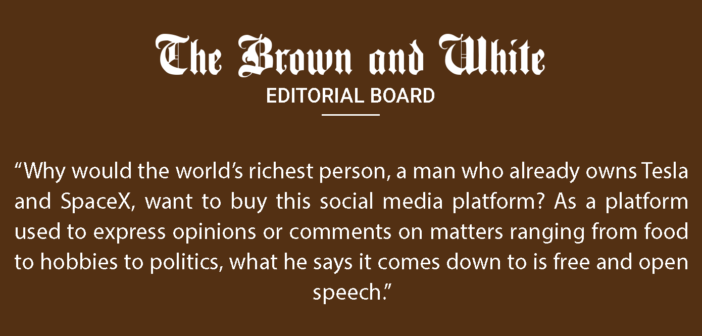If you had $44 billion to spend, what would you choose to buy?
With that much money, your shopping cart could look something like this: $120 to each U.S. citizen, one year of tuition at Yale University for 745,233 students, adoption fees for 286,666,666 dogs and cats, 10,238 private islands in the Caribbean or eight Buckingham palaces.
If it’s not clear to you yet, although it probably is, that’s a lot of money — the amount Elon Musk used to purchase Twitter on April 25.
So, why would the world’s richest person, a man who already owns Tesla and SpaceX, want to buy this social media platform?
As a platform used to express opinions or comments on matters ranging from food to hobbies to politics, what he says it comes down to is free and open speech.
In the words of Musk, “I think it’s very important for there to be an inclusive arena for free speech. Twitter has become kind of the de facto town square, so it’s just really important that people have both the reality and the perception that they are able to speak freely within the bounds of the law.”
Looking back on the past decade, Twitter executives once held a similar view regarding free speech online, resulting in a little to no moderation that paralleled free speech laws around the country.
Yet, when faced with users utilizing the platform to invoke violence, harassment of other users and even the tampering of elections, restrictions were considered to be necessary to protect speech.
Hateful accounts were banned. Information published by users that was deemed harmful was removed from the platform. Labels were added to tweets containing misinformation, limiting their ability to spread through the platform. All these measures resulted in scrutiny against the company.
Despite this backlash, with Musk’s plans to end Twitter’s content moderation policies, some Twitter employees are fearful of his takeover.
Notorious for his unpredictability, it’s difficult to forecast what Twitter will look like under Musk’s control.
On a platform that used to have an abundance of checks and balances, Musk’s takeover is feared to result in the spread of misinformation and disinformation across the site.
Much of the political left is dreading Musk’s leadership, viewing him as a profiteer with reckless disregard for others and a selfish perspective aimed at maximizing his own income and ignoring personal responsibility.
Yet, the billionaire has repeatedly driven himself to near-bankruptcy. For instance, in 2008, he used his money to help Tesla make payroll through a tough stretch. He labels himself as an engineer and shudders at the thought of being an investor. In addition, before buying Twitter, Tesla was reportedly the only publicly traded stock he owned.
However, criticism of his leadership is not invalid. In 2020, Musk resisted local public-health authorities by keeping his factories open as the pandemic worsened, ultimately putting workers at higher risk. Musk’s companies have faced lawsuits for working conditions, including allegations of sexual harassment and racial abuse.
While Musk himself hasn’t been accused of committing any wrongdoing, he is certainly responsible for the work environment created under his authority.
Though many users see his reign as an abuse of power, Musk sees this as a good deed for the world.
Many Conservatives agree with Musk, wanting to fully and openly make use of what they deem is their U.S. right to free speech on Twitter, without feeling as if they are being censored.
For certain philosophies, having more speech is always better than having less speech. With more information available on the Internet, that means the more informed and educated citizens can be, right?
This is a fair point. Freedom of speech is one of our fundamental rights as U.S. citizens.
However, it is also fair to say that this deregulation may lead to the onset of echo chambers — the simple act of liking something on Twitter may lead the algorithm to feed you increasingly radical information or misinformation.
Conservatives may be mistaken in seeing Musk as an ally, because he has historically leaned progressive. For example, Musk was such a strong supporter of President Barack Obama that he once stood in line for six hours to shake the former president’s hand.
Additionally, during President Trump’s time in office, Musk agreed to serve on two presidential advisory councils, but he lasted less than six months, resigning from both due to the administration’s decision to pull out of the Paris Climate Accord.
Regardless of your opinion on the matter, there really are no “sides” to take. While Liberals and Conservatives may not agree on everything, Musk’s leadership poses both potential harm and value — but especially with him, there are never any guarantees.
Musk is neither for one side or the other.





Comment policy
Comments posted to The Brown and White website are reviewed by a moderator before being approved. Incendiary speech or harassing language, including comments targeted at individuals, may be deemed unacceptable and not published. Spam and other soliciting will also be declined.
The Brown and White also reserves the right to not publish entirely anonymous comments.
2 Comments
Good balanced reporting here as Musk is essentially a libertarian which is what you describe wherein left wing liberals & conservatives don’t really know what to expect.
Free speech was squelched under former Twitter leaders for the supposed reason of misinformation but in reality it was about a political agenda.
Bullshit. Musk is a far right white supremacist asshole. Period. The editorial board is on drugs.